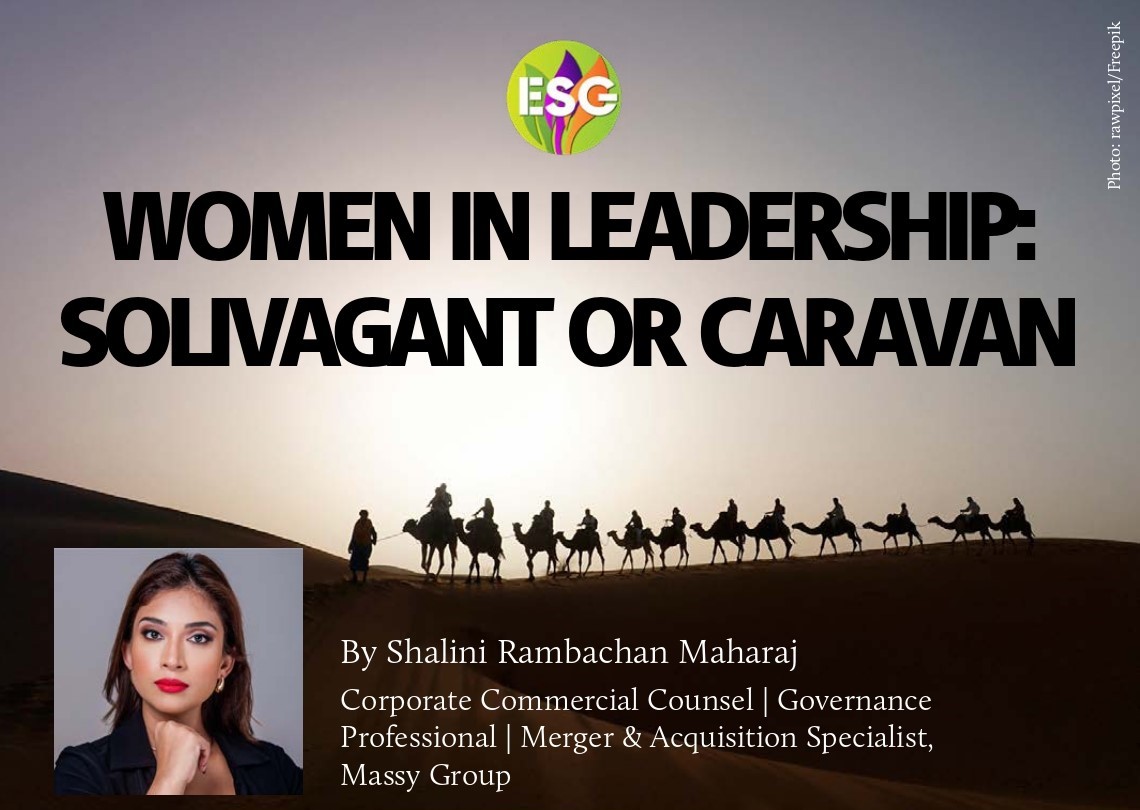WOMEN IN LEADERSHIP:
Solivagant or Caravan
By Shalini Rambachan Maharaj
Corporate Commercial Counsel | Governance
Professional | Merger & Acquisition Specialist,
Massy Group

LINKAGE Q2 (2024) - INSPIRE INCLUSION
Introduction
In the evolving landscape of global leadership, women are increasingly at the forefront, driving profound transformations with their unique perspectives and empathetic leadership styles. The title "solivagant or caravan" encapsulates the dual roles women in leadership navigate: the choice between forging ahead independently or journeying collectively with teams and communities. This dichotomy symbolizes their diverse approaches—whether tackling challenges autonomously or fostering collaborative paths to achieve shared goals and aspirations.
This article explores the pivotal contributions of women in leadership, their resilience in overcoming challenges like gender biases and underrepresentation, and their pivotal role in promoting global Environmental, Social, and Governance (“ESG”) standards. Highlighting their impact through advocacy for inclusivity, legislative innovation, and sustainable practices, women leaders are shaping a more equitable and sustainable future for organizations and society at large.
Pioneering Inclusion and Legislative Innovation
Across the globe, female leaders are championing initiatives that promote inclusivity and progressive legislation. Women in leadership are not just seeking a seat at the table; they are creating spaces where everyone can contribute and thrive. This mindset distinguishes women leaders and underscores their commitment to fostering diverse and inclusive environments.
Breaking Barriers and Building Character
Women leaders often confront and overcome significant barriers, including gender biases, underrepresentation, and limited access to mentorship and networking opportunities. These challenges contribute to their resilience and breadth of experience, enabling them to offer diverse perspectives and make profound impacts as they rise through the ranks. Their journeys equip them with the insights needed to navigate complex organizational landscapes and drive meaningful change.
Empowering Culture and Holistic Growth
The phrase "culture eats strategy for breakfast" encapsulates the importance of a strong, empowering organizational culture. Women leaders excel in creating such cultures by integrating practices, policies, and processes that promote holistic growth. Their approach benefits their organizations and society, fostering environments where collaboration and innovation can flourish.
Creating Inclusive Workplaces
One of the most significant contributions of women in leadership is their commitment to inclusivity. This goes beyond representation, aiming to create workplaces where all employees feel valued, respected, and empowered. Women leaders have long championed policies and practices that support diversity and inclusion, such as:
• Flexible Work Arrangements: Accommodating the diverse needs of employees and promoting work-life balance.
• Mentorship Programs: Offering guidance, support, and career development opportunities for both men and women across all organizational levels.
• Diverse Hiring Practices: Developing recruitment strategies to eliminate biases and create equal opportunities for candidates from different backgrounds.
Leading Legislative Changes
Women in leadership frequently lead legislative changes within their organizations, championing fairness, equity, and innovation. Their efforts encompass:
• Policy Development: Creating policies that address gender pay equity, anti-discrimination, and workplace safety, ensuring thorough and effective measures.
• Advocacy and Lobbying: Pushing for legislative reforms benefiting employees and the broader community, such as family-friendly workplace laws, environmental sustainability initiatives, and ethical business practices.
• Compliance and Ethics: Emphasizing the importance of compliance and high ethical standards, ensuring organizations meet legal requirements and maintain stakeholder trust.
• Innovation and Sustainability: Promoting legislative changes that encourage innovation and sustainability, including initiatives like renewable energy adoption, sustainable supply chain practices, and corporate social responsibility programs.
Case Study: Christiana Figueres
Christiana Figueres, a Costa Rican diplomat, served as the Executive Secretary of the United Nations Framework Convention on Climate Change (UNFCCC) from 2010 to 2016. Her tenure was marked by pivotal contributions to the negotiation and adoption of the Paris Agreement in 2015, a landmark accord aimed at addressing global climate change challenges through unified international commitments.
Figueres played a crucial role in rallying countries and stakeholders worldwide to commit to ambitious climate action under the Paris Agreement. Her diplomatic acumen and strategic leadership were instrumental in bridging gaps and fostering consensus among diverse parties. Throughout her term, she advocated vigorously for renewable energy investments and policies to combat climate change, emphasizing the economic benefits and sustainability advantages of transitioning to clean energy sources. Figueres also engaged proactively with businesses, promoting the integration of ESG considerations into corporate strategies. She underscored the business case for sustainability, highlighting that companies can achieve long-term profitability while contributing positively to society and the environment. Beyond policy negotiations, Figueres focused on raising public awareness about climate change, encouraging global citizens to take proactive steps towards sustainability through educational initiatives and grassroots campaigns.
Figueres' leadership at the UNFCCC culminated in the adoption of the Paris Agreement, uniting nearly 200 countries in commitments to limit global temperature rise and enhance climate resilience. Her advocacy spurred numerous businesses to adopt sustainable practices, integrate ESG criteria into decision-making processes, and enhance transparency regarding their environmental and social impacts. Figueres' global influence extended beyond policy circles, inspiring individuals, communities, and organizations worldwide to prioritize sustainability and take concrete actions towards addressing climate change. Her legacy underscores the significant impact a female executive can have in driving international cooperation and advancing sustainability and ESG measures on a global scale, continuing to inspire leaders across sectors towards a more sustainable future.
Implementation of Global ESG Standards
Women leaders are instrumental in implementing global ESG standards that guide organizations toward sustainable and ethical practices. These standards encompass environmental impact mitigation, social responsibility enhancement, and governance excellence, reflecting women's leadership in promoting transparency and accountability.
Listening to Giselle Carr, Head of Brand and Communications at InPlanet, during her TEDx Port of Spain talk in October 2023, she highlighted the need for passionate advocacy in driving the sustainability agenda.
Carr’s multifaceted approach to advocacy has led to her championing efforts focused on enhancing energy efficiency, reducing waste, and promoting sustainable sourcing practices. Additionally, Carr actively collaborates with industry peers and stakeholders to advance sustainability standards through participation in forums, conferences, and collaborative initiatives across sectors. Beyond corporate leadership, she engages in policy advocacy, promoting regulatory frameworks that incentivize ESG investments and contribute to a sustainable economy. Her emphasis on making sustainability efforts both impactful and achievable demonstrates how women are setting the leadership agenda.
Still, ESG implementation encounters obstacles such as legislative alignment, greenwashing risks, measurement complexities, regulatory ambiguity, resource limitations, and varying stakeholder agendas. However, female leaders persist in their dedication to reshaping corporate practices and societal norms through ESG investing. Overcoming these challenges as a female executive requires steadfast leadership, proactive engagement with diverse stakeholders, advocating for transparent and standardized ESG metrics, navigating regulatory landscapes adeptly, leveraging innovation to manage costs efficiently, and aligning corporate strategies with broader societal goals.
Conclusion
Women in leadership are catalysts for transformative change, cultivating inclusive environments and driving legislative innovation that enhances organizational equity and societal progress. As more women ascend to leadership roles, their impact will continue to expand, benefitting organizations and communities worldwide. By advocating for inclusivity, championing legislative reform, and advancing global ESG standards, women leaders are paving the way for a brighter, more sustainable future.
Are women in leadership solo travelers or a collective force? Inclusion empowers choice—whether navigating independently or leading collaboratively, the impact of their leadership resonates widely.
ABOUT THE AUTHOR

Shalini Rambachan Maharaj is currently the Corporate Commercial Counsel | Governance Professional | Merger & Acquisition Specialist at Massy Group